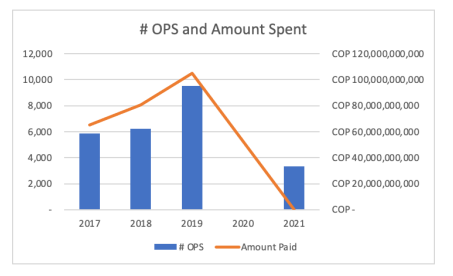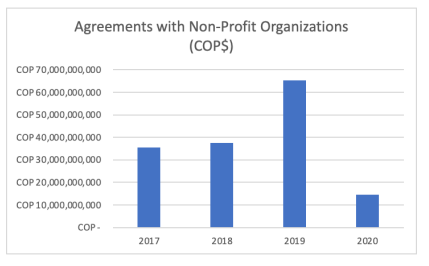Transparency and Anti-Corruption Advisory Group
Published: April, 2022
Public procurement is one of the most vulnerable processes to the phenomenon of corruption. According to the Organization for Economic Cooperation and Development -OECD- (2014), around 57% of the bribes are paid to obtain the award of a contract and 12% in custom procedures.
Cartagena is no stranger to this situation. Since the transition process and while examining the condition of each of the city agencies and departments before initiating the new government, the administration of Salvemos Juntos a Cartagena, under the leadership of William Dau, evidenced disturbing governance issues, weak institutions and lack of transparent rules and procedures, exposing the city of Cartagena to a high risk of corruption. And the procurement process is in the center of it.
A high percentage of the budget of the City of Cartagena allocated to procure goods and services essential to the community, was diverted by previous administrations and through public contracting to satisfy private interests, deteriorating the quality of life of the city and its residents. The “Cartagena Como Vamos” survey confirms this: 47.8% of the population in Cartagena lives under the poverty line, being the highest percentage among the biggest capital cities in Colombia, and 12.6% live under the extreme poverty line.
The new administration detected that one of the modalities most used for the diversion of money is through temporary service agreements (known in Spanish as Ordenes de Prestación de Servicios or OPS). By keeping an obsolete and insufficient personnel structure, the different departments and agencies of the municipality are forced to hire a huge percentage of the individuals required to execute the missionary tasks through these OPS.
During 2021, under the new administration, the amount paid for personnel engaged through OPS was not even 0.1% of what was spent in 2019, confirming that a large part of these hiring was not necessary for the operation of the city, nor to advance investment projects. Moreover, 2019 was an electoral year, so it can be inferred that a significant amount of these OPS was diverted to pay electoral favors or to finance political campaigns.

Another contracting modality commonly used in Cartagena to favor illegal private interests, is entering into association and cooperation agreements with nonprofit organizations. These types of agreements which, according to the Public Administration Contracting Statute, should be exceptional and for restricted purposes, are excluded from competitive bidding. Because the purpose of this contracting should be assisting the most vulnerable population, the Statute allows the public entity to choose the nonprofit organization directly, based on its manifest suitability and expertise. An investigation carried out in 2020 by the Transparency and Anticorruption Group of the Cartagena Major Office, the illegal and excessive use of this type of agreements with “ghost” and “all-purpose” nonprofits was exposed. The current administration has worked hard to substantially minimize this tendency, resorting to this type of agreements only in the cases established by law.

Similar evaluations were conducted on other contracting modalities that represent a high percentage of the Major Office’s budget, which amounts to nearly one billion Colombian Pesos. The analysis of public contracting for the construction and/or improvement of hospitals, schools, roads, infrastructure related to utilities and environmental improvement plans, confirmed a significant diversion of money. The evidence obtained varies from lack of quality of the works received, early deterioration or simply the lack of proof of the existence of the good or service contracted.
These findings are documented with figures and facts in a transparency exercise carried out by the administration of Salvemos Juntos a Cartagena in a document known as the “White Paper of Let’s Save Cartagena”, which brutally shows the state of contracting in Cartagena and the situation of the departments at the beginning of the current administration.
Another element to consider is the port of Cartagena and its strategic location, which makes the city highly desirable for criminal groups who traffic with narcotics; it is also a renowned tourist destination with a coveted real estate market that might be considered the ideal scenario for money laundering.
At this point of the exercise, there are still many questions that remain unsolved, in terms of transparency and anti-corruption: What is the destination of the deviated money? Who are the real beneficiaries? Which are the criminal enterprises capturing the contractual system of Cartagena? Is there any relationship between narcotics trafficking, political campaigns, and the contracting process? There are many signs indicating there might be some connection, but no legally supported evidence and the judiciary system has been ineffective (or accomplice).
Given this scenario and considering the limited resources of the city to meet the historical social debt with the most vulnerable citizens, support from the international community is needed to counter the scourge of corruption in public contracting. This international aid is required not only in terms of technical assistance, but also in funds aimed at strengthening the institutional framework through modernization of the administrative structure of the Cartagena Mayor Office; to implement a policy of integrity not only focused in public servants, but also engaging contractors and the community in general; to strengthen open government and citizen oversight; to develop and implement a methodology through analytical data to assist in early detection of contracts aimed at diverting public resources. All these activities are of great importance for the Mayor’s Office, whose main challenge – as defined in its Development Plan – is to minimize the risk of corruption and to improve the quality of lives of the Cartageneros, especially those most vulnerable residents, the ones more in need.
References
Alcaldía Distrital de Cartagena (2020). Libro Blanco. Available online: https://www.cartagena.gov.co/images/2020/BannerP/09122020/Libro%20Blanco%20Salvemos%20Juntos%20a%20Cartagena.pdf
Organization for Economic Cooperation and Development -OECD- (2014). Scale of international bribery laid bare by new OECD report. Available online: https://www.oecd.org/newsroom/scale-of-international-bribery-laid-bare-by-new-oecd-report.htm
Transparencia por Colombia (2020). Recomendaciones para evitar riesgos de corrupción en la contratación pública y facilitar ejercicios ciudadanos. Available online: https://transparenciacolombia.org.co/2020/11/05/recomendaciones-para-evitar-riesgos-de-corrupcion-en-la-contratacion-publica-y-facilitar-ejercicios-ciudadanos/
